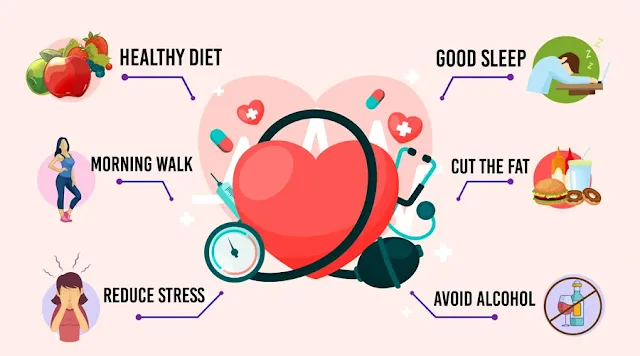How to Lower Your Risk of Heart Disease Through Lifestyle Changes

d) Limit Salt and Sugar Intake
High sodium levels are linked to high blood pressure, a leading cause of heart disease. Cut back on processed and packaged foods, which often contain excessive salt. Additionally, reduce sugar intake to prevent obesity and diabetes—two major risk factors for heart disease. Choose water over sugary beverages, and opt for whole fruit instead of fruit juices.
2. Maintain a Healthy Weight
Being overweight or obese puts significant strain on your heart. Excess weight can lead to high cholesterol, high blood pressure, and insulin resistance, all of which increase your risk of developing heart disease. By maintaining a healthy weight through diet and exercise, you can help prevent these conditions.
a) Calculate Your Body Mass Index (BMI)
BMI is a useful tool for determining whether you're at a healthy weight. A BMI between 18.5 and 24.9 is considered normal, while a BMI over 30 indicates obesity. If you are overweight, losing just 5-10% of your body weight can have a meaningful impact on heart health.
b) Focus on Portion Control
Even healthy foods can lead to weight gain if consumed in large amounts. Practice mindful eating by paying attention to portion sizes and avoiding second servings. Eating slowly and savoring your food can also help you feel full faster and prevent overeating.
3. Get Regular Physical Activity
Physical activity is one of the most effective ways to strengthen the heart and improve circulation. Regular exercise helps lower blood pressure, reduce bad cholesterol (LDL), raise good cholesterol (HDL), and maintain a healthy weight.
a) Aim for 150 Minutes of Moderate Exercise Per Week
The American Heart Association recommends at least 150 minutes of moderate-intensity aerobic exercise each week, such as brisk walking, swimming, or cycling. If you prefer more vigorous activities, like running or high-intensity interval training (HIIT), 75 minutes per week may be sufficient.
b) Incorporate Strength Training
In addition to cardio, strength training exercises like lifting weights or using resistance bands are important for maintaining muscle mass, improving metabolism, and promoting overall cardiovascular health. Try to incorporate strength training into your routine at least two days a week.
c) Make Movement a Habit
Incorporating physical activity into your daily routine can make a significant difference. Take the stairs instead of the elevator, park farther away from your destination, or take short breaks during work to stand and stretch. These small changes can add up to big health benefits over time.
4. Quit Smoking and Limit Alcohol Intake
Smoking is one of the most significant risk factors for heart disease, and quitting is one of the most important steps you can take for your heart. Tobacco smoke contains harmful chemicals that damage the blood vessels, increase blood pressure, and reduce oxygen in the blood. Even exposure to secondhand smoke can contribute to heart disease.
a) Seek Help to Quit Smoking
Quitting smoking is difficult, but numerous resources are available to help, including nicotine replacement therapy, prescription medications, and support groups. The benefits of quitting start almost immediately, with blood pressure and heart rate decreasing within minutes of your last cigarette.
b) Limit Alcohol Consumption
Excessive alcohol consumption can raise blood pressure, contribute to weight gain, and increase the risk of developing heart disease. It’s recommended that men limit themselves to two drinks per day and women to one drink per day. If you don’t drink, it’s best not to start, as alcohol has more risks than benefits when it comes to heart health.
5. Manage Stress
Chronic stress can negatively impact the heart by raising blood pressure, increasing inflammation, and leading to unhealthy coping mechanisms such as overeating or smoking. Managing stress is essential for maintaining good heart health.
a) Practice Relaxation Techniques
Mind-body practices such as meditation, yoga, deep breathing exercises, and mindfulness can help reduce stress and improve emotional well-being. These techniques are shown to lower cortisol levels, a hormone associated with stress, and enhance overall cardiovascular health.
b) Prioritize Sleep
Quality sleep is essential for heart health. Lack of sleep has been linked to high blood pressure, obesity, and diabetes—conditions that increase the risk of heart disease. Adults should aim for 7-9 hours of sleep per night. Create a bedtime routine that promotes relaxation, and avoid screens or caffeine close to bedtime.
c) Maintain Social Connections
Strong social connections can improve mental and emotional health, helping to buffer the effects of stress. Nurture relationships with family and friends, and don't hesitate to seek help from a therapist or counselor if you're feeling overwhelmed.
6. Monitor and Manage Key Health Indicators
To further reduce your risk of heart disease, it's essential to monitor key health metrics that can signal potential problems.
a) Monitor Blood Pressure
High blood pressure, or hypertension, is a major risk factor for heart disease. Regularly check your blood pressure and work with your doctor to keep it within a healthy range. Lifestyle changes such as a low-sodium diet, regular exercise, and stress reduction can help control blood pressure.
b) Check Cholesterol Levels
High levels of LDL cholesterol can lead to plaque buildup in arteries, increasing the risk of heart attacks and strokes. If your cholesterol levels are high, dietary changes, exercise, and possibly medication may be necessary to bring them down.
c) Control Blood Sugar
High blood sugar levels can damage blood vessels and contribute to heart disease, especially for people with diabetes. Regular monitoring of blood glucose and making dietary adjustments can help keep blood sugar levels stable.
7. Stay Consistent with Preventative Care
Regular check-ups with your healthcare provider are essential for early detection and prevention of heart disease. Routine screenings for blood pressure, cholesterol, and blood sugar can help catch potential issues before they become serious.
a) Take Prescribed Medications
If you have existing risk factors like high blood pressure or high cholesterol, it's important to take any prescribed medications as directed by your doctor. These medications can significantly lower your risk of heart disease by keeping these conditions under control.
b) Stay Informed About Your Heart Health
Being proactive about your heart health means staying informed about new guidelines, treatments, and preventive measures. Work closely with your healthcare provider to develop a personalized plan that suits your individual risk factors and lifestyle.
Conclusion
While heart disease remains a leading health concern, there is much you can do to reduce your risk. By adopting a heart-healthy diet, maintaining a healthy weight, staying physically active, quitting smoking, managing stress, and monitoring key health metrics, you can take control of your heart health. The changes you make today can have a profound impact on your well-being and quality of life, both now and in the future.



